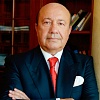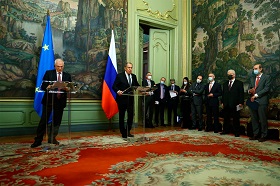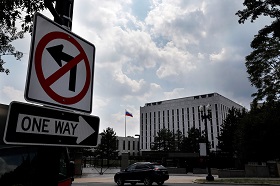These days, pretty much everyone fancies themselves as a diplomat or a foreign policy expert at the very least. Without the slightest hint of hesitation, they are willing to voice their opinions on the most sensitive of international issues, brazenly tell us how we should be doing our jobs and share with us their sure-fire ways of quickly resolving long-standing problems, all the while ensuring and securing Russia’s interests. An inevitable consequence of this is that the global community is never quite sure what Russia’s official position actually is, which in turn leads to lopsided interpretations of Moscow’s foreign policy aspirations.
Given the unprecedented numbers of “armchair diplomats” we have today, it is hardly surprising then that politicians have absolutely no qualms about using real diplomats, and sometimes even entire diplomatic missions, as bargaining chips in the current global geopolitical confrontation. Depending on who you talk to, the “ambassadorial war” that is going on between Russia and the West has seen as many as 600 diplomats expelled from host countries. We have never seen anything like this in the history of diplomacy, and the sad truth is that the number of “casualties” will likely continue to grow.
The consequences of such a cavalier attitude towards the diplomatic service could be severe.
Most people would be surprised to hear that practically all the “safety” mechanisms set up over the course of decades to prevent isolated crises from escalating into direct military conflicts have in recent years been destroyed. The number of such mechanisms is shrinking, while the number of conflict situations is growing.
There are no “easy outs” here. Even with all the political will in the world and the accumulated potential of professional diplomacy, no one will be able to effortlessly untangle the tangled knot of international problems. We thus need to prepare ourselves for long and difficult negotiations. Launching this most difficult of mechanisms should be our key priority right now. Perhaps the best way to do this, as President of the Russian Federation Vladimir Putin has suggested, would be to organize a meeting of the leaders of the UN Security Council permanent members as soon as possible.
When I was hired by the Ministry of Foreign Affairs of the Soviet Union as an interpreter in the mid-1970s, the hardest thing about the job was translating for politicians who somehow “spoke” the language of their partners. They would often want to show off their skills, often interrupting the interpreter to say, “I got it. Go on.” This meant that important nuances, points of emphasis and details were lost in the process, which made it extremely difficult to ascertain the other side’s position with any degree of accuracy, let alone seal any specific agreements.
These days, pretty much everyone fancies themselves as a diplomat or a foreign policy expert at the very least. Without the slightest hint of hesitation, they are willing to voice their opinions on the most sensitive of international issues, brazenly tell us how we should be doing our jobs and share with us their sure-fire ways of quickly resolving long-standing problems, all the while ensuring and securing Russia’s interests. An inevitable consequence of this is that the global community is never quite sure what Russia’s official position actually is, which in turn leads to lopsided interpretations of Moscow’s foreign policy aspirations.
Given the unprecedented numbers of “armchair diplomats” we have today, it is hardly surprising then that politicians have absolutely no qualms about using real diplomats, and sometimes even entire diplomatic missions, as bargaining chips in the current global geopolitical confrontation. Depending on who you talk to, the “ambassadorial war” that is going on between Russia and the West has seen as many as 600 diplomats expelled from host countries. We have never seen anything like this in the history of diplomacy, and the sad truth is that the number of “casualties” will likely continue to grow.
The consequences of such a cavalier attitude towards the diplomatic service could be severe.
By all accounts, the world is already at war. Call it what you want: psychological warfare, information warfare, ideological warfare, hybrid warfare, or any other name you care to come up with. The label itself is not important, while the increasingly real risk of military confrontation is. Even if it does not come to that, the damage caused by the years of conflict is growing in all areas, whether politics, economy or social interactions for that matter.
Typically, there are only two ways a war can end—in a sweeping victory for one of the sides or in a compromise agreement that suits the interests of both sides. Today, there is no single country in the world that is capable of winning a regional confrontation, let alone a global war. This means that we need to look for agreements that would take us off our current path towards global destruction and open up opportunities for countries to work together in a productive manner.
One sure thing is that the parties will sooner or later have to sit down at the negotiating table. Those who’d held on to their best diplomats and experienced negotiators, having put together well thought-out and realistic bargaining positions, will clearly have the upper hand in such talks.
COVID-19 has shaken the global community to expose our vulnerability in the face of a deadly disease. Most experts concur that the mass vaccination programmes launched across the world will eventually lead to global herd immunity, signalling the end of the pandemic. Thankfully, the continued attempts to politicize the issue of vaccination are starting to recede into the background as the international community is becoming increasingly aware of our interconnectedness and the need to reach out and help one another in difficult times.
That said, we have to concede that such an awareness is sadly lacking among individual countries, regions and continents when it comes to issues of security. It would seem that the world’s leading politicians and experts—as well as the international community at large—are not yet ready to admit the obvious: today, any serious international crisis, even in a most isolated corner of the planet, could any time emerge as a global catastrophe, much in the same way that a dangerous infectious disease, no matter where it originated, can end up posing a real threat to human existence.
Most people would be surprised to hear that practically all the “safety” mechanisms set up over the course of decades to prevent isolated crises from escalating into direct military conflicts have in recent years been destroyed. The number of such mechanisms is shrinking, while the number of conflict situations is growing. You don’t have to be an imaginative author of post-apocalyptic dystopian novels to see where this could lead us.
There are no “easy outs” here. Even with all the political will in the world and the accumulated potential of professional diplomacy, no one will be able to effortlessly untangle the tangled knot of international problems. We thus need to prepare ourselves for long and difficult negotiations. Launching this most difficult of mechanisms should be our key priority right now. Perhaps the best way to do this, as President of the Russian Federation Vladimir Putin has suggested, would be to organize a meeting of the leaders of the UN Security Council permanent members as soon as possible.
If such a meeting happens, its participants will need to acknowledge that the world is approaching the proverbial “point of no return”, conceding that a global war knows no winners. As soon as they reach this self-evident conclusion, they could then set about forming a working group under the auspices of the UN Security Council to organize and hold negotiations on the most pressing international relations issues. In doing so, the permanent members of the UN Security Council would be fulfilling its “primary responsibility for the maintenance of international peace and security”, as set out in the UN Charter.






